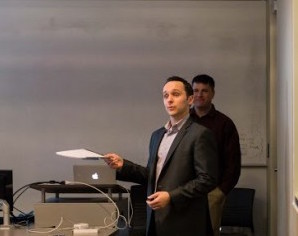
Lake Michigan is the city’s main water source, but with antibiotic-resistant bacteria living in Milwaukee’s harbor, students question the safety of campus tap water.
Luckily, the water on campus is safe to drink. At least, that’s the verdict of a couple biology professors in the College of Arts & Sciences.
“There’s always a lot of bacteria in the environment, but the bacteria that (Assistant Biological Sciences Professor Krassi Hristova) found (in the Milwaukee harbor) gets cleaned out of our water,” said John Bennett, a professor of biological sciences.
Bennett said a water filter is not necessary because the city filters the water before it is distributed. He said he regularly uses and drinks campus tap water.
Milwaukee Water Works pumps approximately 103 million gallons of filtered water to 865,000 people in 16 communities daily, according to the 2014 Milwaukee Water Works statistics. Water from Lake Michigan is filtered through a nine-step treatment process that disinfects the water, removes color and odor and adds necessary minerals.
The water then travels from the treatment plant through 2,000 miles of water lines to homes and businesses.
Since 1993 MWW invested $459 million with infrastructure to filter and purify water for the city to safely use, according to their website.
“Milwaukee’s water meets Environmental Protection Agency Standards and it is regularly tested for contaminants,” said Daniel Zitomer, a professor of civil, construction and environmental engineering and the director of the Water Quality Center.
Timothy LaPara, a professor of environmental engineering at the University of Minnesota, visited Marquette Jan. 27 to talk on water disinfection strategies. He said tap water is generally safer than a filtered alternative and he thinks Milwaukee tap water is among the safest in the world.
“People tend to correlate drinking water quality with taste, which isn’t necessarily the same as safe,” LaPara said.
When it comes to Brita water filters, LaPara said they’re great for improving water taste, but they’re either neutral or negative when it comes to improving water safety.
“(Brita filters) will remove the disinfectant in the water, which will allow microbes to grow and those could potentially be pathogenic,” LaPara said.
He said Brita filter technology proved to work but stressed that filters should be changed when recommended by the Brita company.
“One of the problems with the Brita filters is you take compounds out of the water and it doesn’t destroy them—they stick to the (filter’s) black stuff,” LaPara said. “If you keep adding and adding and adding (compounds), eventually they come back off.”
On its website, MWW lists all contaminants found in Milwaukee’s water source prior to treatment. The site explains that the existence of certain contaminants in drinking water does not always pose a health risk, and that some substances are actually beneficial to one’s health if they are not consumed in large amounts.
MWW also warns certain populations against the dangers of ingesting water contaminants.
According to MWW’s website, “Some people may be more vulnerable to contaminants in drinking water than the general population. Immunocompromised persons such as persons with cancer undergoing chemotherapy, persons who have undergone organ transplants, people with HIV/AIDS or other immune system disorders, some elderly, and infants can be particularly at risk from infections.”
